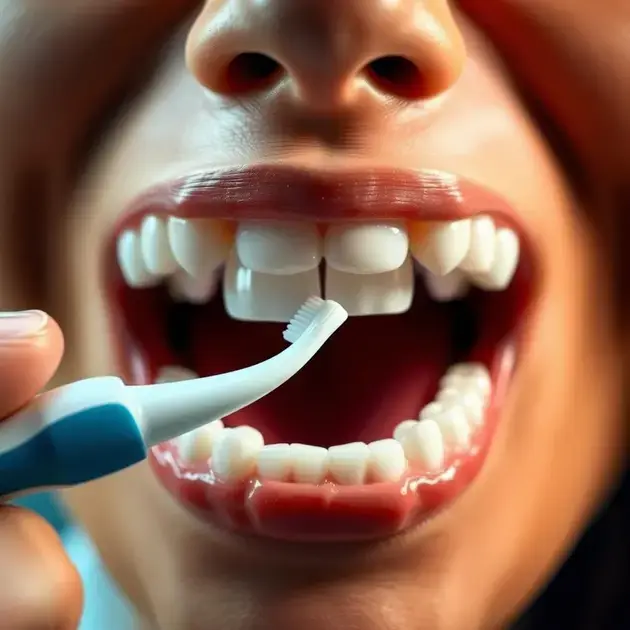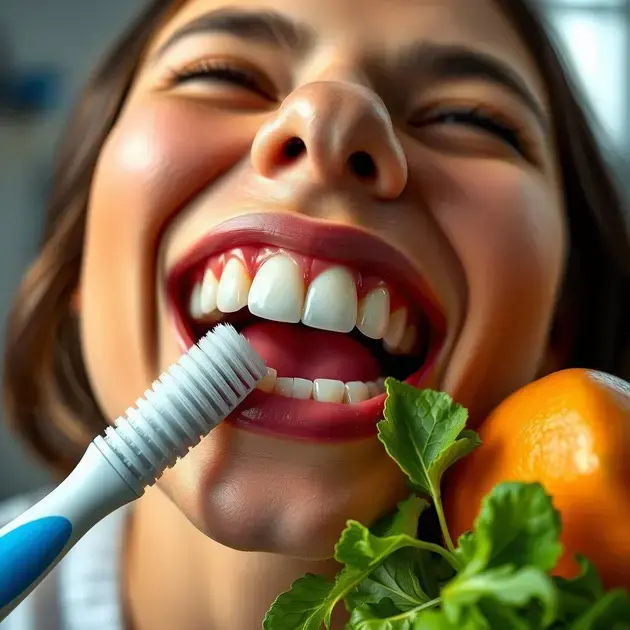Maintaining healthy habits for stronger teeth is essential not just for a brilliant smile, but for overall health as well. Recent studies suggest that good oral hygiene can help prevent various diseases, such as heart disease and diabetes. This connection highlights the importance of practices that contribute to dental health, advocating for a daily routine that supports strong teeth and gums.
Among the pivotal practices, brushing twice a day, flossing regularly, and choosing the right toothpaste stand out as foundational steps. Adding to this, consuming a balanced diet rich in vitamins and minerals supports not only general health but also enhances oral wellness. Let’s embrace these practices to ensure our smiles remain vibrant and our bodies healthy for years to come.

Develop a Consistent Oral Care Routine
Establishing a consistent oral care routine is crucial for maintaining good dental health. Here is a step-by-step guide to help you develop a routine that will keep your teeth and gums healthy:
1. Brushing
Brush your teeth at least twice a day, in the morning and before bed. Use a fluoride toothpaste and a soft-bristled toothbrush. Make sure to brush all surfaces of your teeth, including the back molars, and brush gently to avoid damaging your gums.
2. Flossing
Don’t forget to floss at least once a day to remove plaque and food particles from between your teeth. Use a gentle back-and-forth motion to clean the sides of each tooth and below the gumline. Regular flossing helps prevent gum disease and cavities.
3. Mouthwash
Incorporate a fluoride or antiseptic mouthwash into your routine for added protection against bacteria and bad breath. Rinse for 30 seconds after brushing and flossing to reach areas that may have been missed.
4. Regular Dental Check-ups
Visit your dentist for regular check-ups and cleanings every six months. Your dentist can detect any dental issues early on and provide professional cleaning to keep your teeth and gums in top condition.
5. Healthy Habits
Avoid sugary snacks and drinks, quit smoking if you’re a smoker, and drink plenty of water throughout the day. These healthy habits contribute to overall dental health and can prevent oral health problems in the long run.
Nourish Your Teeth with a Balanced Diet
Eating a balanced diet is not only beneficial for your overall health but also plays a significant role in maintaining good oral health. Here’s how you can nourish your teeth through the foods you eat:
1. Calcium-Rich Foods
Incorporate calcium-rich foods such as dairy products, leafy greens, almonds, and fortified foods into your diet. Calcium strengthens your teeth and bones, helping to prevent tooth decay and gum disease.
2. Vitamin C and Vitamin D
Ensure you’re getting enough vitamin C from fruits like oranges, strawberries, and kiwi to promote healthy gums. Vitamin D, found in fatty fish and fortified cereals, helps your body absorb calcium for stronger teeth.
3. Crunchy Fruits and Vegetables
Crunchy fruits and vegetables like apples, carrots, and celery act as natural toothbrushes, cleaning your teeth and stimulating saliva production. This helps wash away food particles and neutralize acid that can harm your teeth.
4. Limit Sugary and Acidic Foods
Avoid excessive consumption of sugary and acidic foods and beverages like candies, sodas, and citrus fruits. These can erode enamel and lead to cavities. If you do indulge, rinse your mouth with water afterward.
5. Stay Hydrated
Drink plenty of water throughout the day to keep your mouth hydrated and stimulate saliva production. Saliva helps neutralize acids, remineralize teeth, and wash away bacteria, maintaining a healthy oral environment.
The Importance of Choosing the Right Oral Care Products
Using the right oral care products is essential for maintaining optimal dental hygiene and health. Here’s how you can select the best products for your oral care routine:
1. Toothpaste
Choose a toothpaste that contains fluoride to strengthen enamel and prevent cavities. Look for the American Dental Association (ADA) seal of approval, indicating that the product has been rigorously tested for safety and effectiveness.
2. Toothbrush
Opt for a soft-bristled toothbrush with a small head to effectively clean all areas of your mouth. Replace your toothbrush every three to four months or sooner if the bristles are frayed. Electric toothbrushes are also a great option for thorough cleaning.
3. Mouthwash
Select a mouthwash that targets your specific oral health needs, such as anti-plaque, anti-gingivitis, or fluoride rinse. Consider alcohol-free options if you have sensitivity. Consult your dentist for recommendations based on your individual concerns.
4. Dental Floss
Use dental floss that glides easily between teeth and is gentle on gums. Choose waxed or unwaxed floss based on your preference. Daily flossing helps remove plaque and debris that brushing alone may miss.
5. Specialty Products
For individuals with specific oral health issues like sensitive teeth, dry mouth, or whitening needs, there are specialized products available. Consult with your dentist to determine if these products would be beneficial for your oral care regimen.

Strengthening Your Teeth Through Daily Hydration
Keeping your teeth strong and healthy is crucial for overall oral health. One way to strengthen your teeth is through daily hydration. By staying hydrated, you can help ensure that your mouth produces enough saliva to protect your teeth from harmful bacteria. In addition to drinking plenty of water throughout the day, consuming water-rich foods such as fruits and vegetables can also contribute to your overall hydration levels.
Furthermore, incorporating fluoride into your daily oral hygiene routine can also help strengthen your teeth. Fluoride is known for its ability to protect teeth from decay and strengthen enamel. Consider using a fluoride toothpaste and mouthwash to maximize the benefits of this mineral.
Another important aspect of daily hydration for strengthening your teeth is to limit the consumption of sugary and acidic beverages. These can erode enamel and contribute to the development of cavities. Opt for water as your main beverage choice and save sugary drinks for special occasions.
In conclusion, daily hydration is essential for maintaining strong and healthy teeth. By drinking plenty of water, consuming fluoride, and avoiding sugary drinks, you can help protect your teeth from decay and maintain optimal oral health.
Incorporating Regular Dental Check-ups into Your Routine
Regular dental check-ups are a critical component of maintaining good oral health. By visiting your dentist regularly, you can identify any potential issues early on and receive the necessary treatment to prevent further problems. Schedule dental check-ups at least twice a year to ensure that your teeth and gums are in optimal condition.
During a dental check-up, your dentist will conduct a thorough examination of your teeth and gums, looking for signs of decay, gum disease, and other issues. They may also perform a professional cleaning to remove plaque and tartar buildup, which can contribute to oral health problems.
In addition to regular check-ups, it is important to practice good oral hygiene at home. Brushing your teeth twice a day, flossing daily, and using mouthwash can help maintain a healthy mouth between dental visits. Your dentist may also provide guidance on proper brushing and flossing techniques to ensure you are effectively cleaning your teeth.
By incorporating regular dental check-ups into your routine and following your dentist’s recommendations for at-home care, you can keep your teeth and gums healthy for years to come.
The Role of Proper Brushing Technique for Optimal Oral Health
Proper brushing technique plays a crucial role in maintaining optimal oral health. Brushing your teeth twice a day is essential for removing plaque and bacteria that can lead to cavities and gum disease. Use a soft-bristled toothbrush and fluoride toothpaste to gently clean all surfaces of your teeth.
When brushing, be sure to use gentle circular motions and pay special attention to the gumline where bacteria can accumulate. Brushing too hard or using a toothbrush with hard bristles can damage enamel and irritate gums, so it is important to be gentle yet thorough.
In addition to brushing, don’t forget to clean your tongue as well. Bacteria can accumulate on the surface of your tongue, leading to bad breath and other oral health issues. Use a tongue scraper or your toothbrush to gently clean your tongue each time you brush your teeth.
Remember to replace your toothbrush every three to four months or sooner if the bristles are frayed. An old toothbrush may not effectively clean your teeth and can harbor bacteria. By following proper brushing technique and maintaining good oral hygiene habits, you can ensure optimal oral health for years to come.
**
Conclusion
**
Ensuring the strength and health of your teeth is paramount for overall oral well-being. Daily hydration plays a significant role in this aspect, as it aids in saliva production to fend off harmful bacteria that can compromise your dental health. Besides consuming an adequate amount of water, incorporating water-rich foods like fruits and vegetables can enhance your hydration levels, benefitting your teeth.
Moreover, integrating fluoride into your daily oral care regimen can further fortify your teeth. Known for its decay-resistant and enamel-strengthening properties, fluoride usage in toothpaste and mouthwash can maximize its protective benefits. Additionally, steering clear of sugary and acidic beverages is crucial for tooth strength, as these can lead to enamel erosion and cavity formation. Opting for water as the primary beverage choice and reserving sugary drinks for occasional indulgence can safeguard your teeth.
In conclusion, daily hydration practices are essential for fortifying and maintaining robust dental health. By embracing habits such as adequate water intake, fluoride incorporation, and avoiding sugary beverages, you can shield your teeth from decay and uphold optimal oral hygiene. Remember, a proactive approach to dental care, including regular check-ups and adherence to proper brushing techniques, will pave the way for a healthy and enduring smile.
